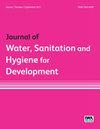人道主义-发展-和平关系下农村供水服务的可持续性:尼日尔迪法案例研究
IF 1.6
4区 环境科学与生态学
Q3 WATER RESOURCES
Journal of Water Sanitation and Hygiene for Development
Pub Date : 2023-01-25
DOI:10.2166/washdev.2023.124
引用次数: 0
摘要
非国家武装团体犯下的暴力已使尼日尔迪法地区25万多人流离失所,并使该地区经济陷于瘫痪。人道主义反应包括对水基础设施的大量投资,这在很大程度上缓解了受流离失所影响人口的迫切需要。然而,持续的不安全威胁到这些农村供水服务的可持续性。越来越多的文献提倡用系统思考的方法来解释农村供水服务的不同可持续性因素之间的相互作用,但几乎完全集中在稳定的背景下。本文的应用研究采用了定性评价方法来确定迪法的不安全感对这些可持续性因素的影响。在2021年3月至6月期间,对来自政府、水管理机构、捐助者和非政府组织的25名受访者进行了采访。研究表明,迪法的不安全感对农村供水服务的所有可持续性因素都产生了负面影响,并阻碍了相关行动者之间的获取、协调和沟通。重叠的人道主义和发展背景以及推动实施三重联系方法(其中包括和平作为第三个要素)使人们在水费的适用、水基础设施的耐久性以及以社区为基础的水管理方法的适用性等方面陷入困境。本文章由计算机程序翻译,如有差异,请以英文原文为准。
Sustainability of rural water services in the humanitarian-development-peace nexus: a case study from Diffa, Niger
Violence committed by non-State armed groups has displaced over 250,000 people in the Diffa region of Niger and crippled the regional economy. The humanitarian response included substantial investment in water infrastructure which has largely alleviated the immediate needs of displacement-affected populations. However, ongoing insecurity threatens the sustainability of these rural water services. A systems-thinking approach to explain the interaction between different sustainability factors for rural water services is advocated by a growing body of literature, but is almost exclusively focused on stable contexts. The applied research reported here adopted a qualitative assessment methodology to determine the impact of the insecurity in Diffa on these sustainability factors. Twenty-five respondents from government, water management structures, donors, and non-governmental organisations were interviewed between March and June 2021. The research demonstrated that insecurity in Diffa impacts negatively on all sustainability factors for rural water services and impedes access, coordination, and communication by and between relevant actors. The overlapping humanitarian and development contexts and the push to implement a triple nexus approach – which includes peace as its third element – raise dilemmas concerning the application of water tariffs, the durability of water infrastructure, and the suitability of a community-based approach to water management.
求助全文
通过发布文献求助,成功后即可免费获取论文全文。
去求助
来源期刊

Journal of Water Sanitation and Hygiene for Development
WATER RESOURCES-
CiteScore
3.10
自引率
11.80%
发文量
58
审稿时长
16 weeks
期刊介绍:
The Journal of Water, Sanitation and Hygiene for Development is a peer-reviewed journal devoted to the dissemination of high-quality information on the science, policy and practice of drinking-water supply, sanitation and hygiene at local, national and international levels.
 求助内容:
求助内容: 应助结果提醒方式:
应助结果提醒方式:


